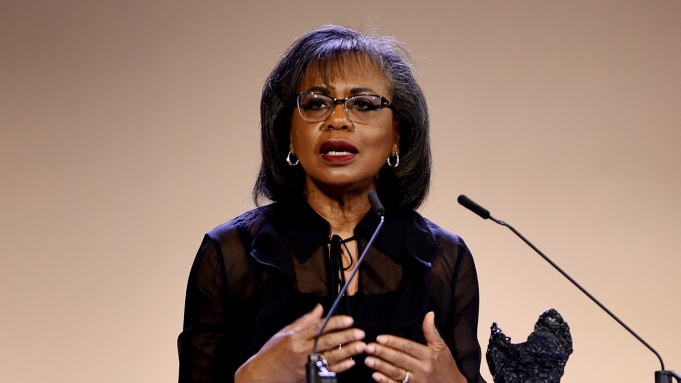Employer Resources: The Hollywood Commission
Promoting safe, equitable and harassment-free environments requires significant resources – time, people and budget. Our goal in preparing this toolkit of resources for production and other entertainment companies is to make sure that, no matter the size of the production, leadership has access to state-of-the-art practices, resources and guidance to promote safe, equitable and harassment-free workplaces. (via The Hollywood Commission)

Anita Hill, Chair, The Hollywood Commission
The Hollywood Commission and its Partner Organizations support the industry-wide adoption of systems to address harassment and discrimination that include, at a minimum:
- Policies and procedures to address and investigate harassment and discrimination
- Training and education on policies and procedures to address and investigate harassment and discrimination
- Mechanisms to report concerns about harassment and discrimination, confidentially and/or anonymously
- Mechanisms to resolve concerns about harassment and discrimination
- Protections from retaliation or reprisal for those individuals who allege violations or who participate in the investigation of any alleged violations.
Build your policies and procedures with guidance from these helpful checklists.
Small entertainment companies may question the need for a system to address harassment and discrimination. With a limited number of employees and resources, implementing a system may seem unnecessarily complicated and expensive. However, state and federal law requires employers – regardless of size – to provide a safe workplace that is free of harassment and discrimination.

Requirement #1: Workplace Conduct Policy
A policy is only one element of an overall program to address harassment and discrimination. It must also be communicated, supported, understood, and enforced.
We’ve developed this sample policy to promote safe, equitable, and harassment-free workplaces. It affirms the entertainment industry’s commitment to providing respectful and inclusive workplaces. Changing the culture isn’t just about what employers can do. It’s also about workers having a shared expectation of what structures should be and are in place to prevent discrimination, harassment, and other inappropriate conduct.
Download SampleRequirement #2: Training
Require all production staff, cast and crew members (including day players), to complete effective anti-sexual harassment, bias and bystander training at regular intervals. Training takes place upon starting work, if not before, including for individuals working during development and pre-production. To the extent possible, training should be tailored to a production’s particular needs and not off the shelf.
Consider using some form of live training, even if only as a supplement to online training. Although productions need formal training as a baseline, every production meeting is an opportunity for awareness training. Constant reinforcement of the essential principles by senior production leadership will go a long way toward production staff, cast and crew members embracing the policy.
Download Checklist

Requirement #3: Reporting System
Production and other staff often don’t report their concerns – often because they don’t trust the process, don’t know how to report or are concerned about retaliation. Consequently, it’s critical for production leadership to make sure everyone feels comfortable making reports and, when they do, the reports are handled immediately, professionally and without a hint of retaliation.
Provide a range of methods for anyone working to report misconduct that includes multiple points of contact, at different organizational levels and in different geographic workplaces, as applicable (e.g., a TV series shoots in New York but maintains a writers’ room in Pasadena and production offices in Santa Monica).
Download ChecklistRequirement #4: Investigation & Resolution
Identify and promptly and effectively address harassment, discrimination, and bullying if it does occur – no matter the employment status or seniority of the person(s) involved.
This checklist will help you to establish the key steps of your investigation and resolution process, including setting expectations regarding fair, timely and thorough investigations, confidentiality, and transparency.
Download Checklist

Requirement #5: Anti-Retaliation Protocol
It’s critical that everyone on production has a safe place to report concerns about retaliation. Substantiated incidents of retaliation should result in discipline, up to and including terminating employment or a contract, or banning individual(s) from the workplace.
Download ChecklistWhat are an Employer's legal responsibilities?
- Employers must provide a workplace free of discrimination and harassment and must take action if they become aware of violations.
- Employers are responsible for the actions of company owners and agents, including supervisors (like unit production managers).
- Employers may be responsible for the actions of non-supervisory employees or even non-employees (such as vendors, independent contractors, or visitors in the workplace) if it had reason to be aware of the conduct but failed to take steps to prevent it.
- Employers must investigate discrimination or harassment if there is reason to believe it has occurred, even in the absence of a formal complaint.

These checklists are a tool to help develop and implement a system to address discrimination and harassment on a production. They are not legal advice and don’t set forth legal requirements relating to discrimination, harassment or retaliation. Not all elements will apply in every workplace. Checking all boxes doesn’t necessarily mean an employer is in legal compliance. The failure to check any particular box doesn’t necessarily mean an employer isn’t in legal compliance. Employers should consult with counsel to make sure they are up-to-date and comply with current law.
Learn MoreMore resources for Production
Supporting Survivors in the Post-Production Phase
Creating Safer Sets
Workplace Conduct Policy

Creating Safer Sets
Protocols for Scenes Involving Nudity
Creating Safer Sets
Creating Safer Sets
Intimacy Coordinators: Standards + Protocols
